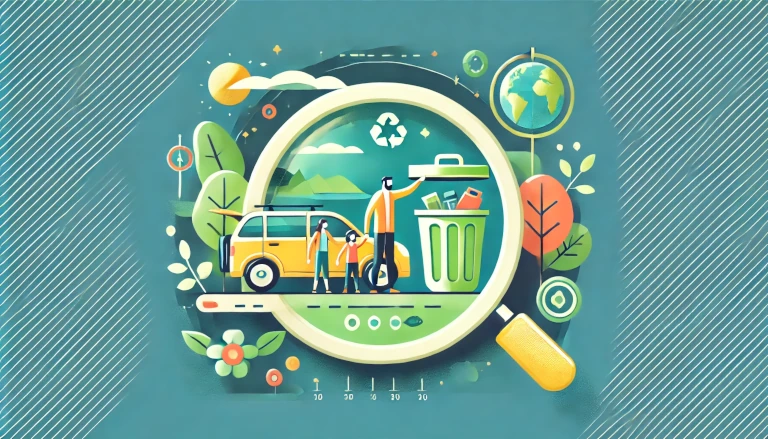Tourism plays a significant role in the global economy, but it also has a profound impact on the environment. As more people travel, it’s essential to adopt sustainable practices that ensure our natural landscapes and ecosystems remain pristine and clean. In this post, we will explore how tourists can make a positive difference by minimizing their environmental footprint, conserving resources, and respecting local ecosystems. Whether you’re visiting a national park or an urban destination, there are many small steps you can take to protect the environment.
🗑️ 1. Practice Responsible Waste Management
One of the simplest ways tourists can help keep the environment clean is by practicing responsible waste disposal. Make sure to always carry a reusable bag to store any waste until you find a proper bin. Avoid littering, especially in natural settings like beaches, forests, or mountains, where non-biodegradable materials can harm wildlife.
Example: While hiking in a national park, tourists can ensure that they carry back all their trash, including plastic bottles, wrappers, and food waste, to prevent harming the local ecosystem.
🚲 2. Use Eco-Friendly Transportation
Tourists can significantly reduce their carbon footprint by choosing eco-friendly transportation. Opting for public transport, walking, cycling, or electric vehicles over renting petrol or diesel cars helps minimize pollution. Whenever possible, use trains or buses instead of airplanes, as they emit far fewer greenhouse gases.
Example: Instead of renting a car for sightseeing, tourists can explore a city by bicycle, reducing both air pollution and traffic congestion while also enjoying a more immersive experience.
🏨 3. Support Local and Sustainable Businesses
Tourists should aim to support local and eco-friendly businesses. These include hotels with green certifications, restaurants that source food sustainably, and shops that sell local and environmentally friendly products. This not only supports the local economy but also promotes sustainable practices.
Example: Staying at an eco-friendly resort that uses solar power and sources food locally helps reduce the overall carbon footprint of your trip, while also benefiting the local community.
💧 4. Minimize Water and Energy Consumption
Being mindful of water and energy usage during travel is crucial. Tourists can do simple things like taking shorter showers, turning off the lights when leaving the hotel room, and reusing towels to minimize laundry. These small actions collectively help reduce the strain on local water and energy resources.
Example: In areas suffering from water scarcity, tourists can be more conscious by limiting water use during showers and opting not to have towels and linens changed daily.
🐾 5. Respect Wildlife and Natural Habitats
Tourists can make a significant difference by respecting local wildlife and preserving their natural habitats. Avoid feeding or disturbing animals, stick to marked trails, and refrain from picking plants or disturbing natural formations. These actions ensure that future visitors can enjoy the environment in its natural state.
Example: While visiting a wildlife sanctuary, tourists should maintain a respectful distance from animals, ensuring they don’t disrupt their natural behavior or habitat.
🌿 6. Choose Eco-Friendly Products and Packaging
Reducing plastic use is vital for maintaining clean environments. Tourists should opt for reusable water bottles, bags, and containers instead of single-use plastics. Buying products with minimal or eco-friendly packaging helps prevent pollution and excessive waste in tourist destinations.
Example: Instead of purchasing bottled water, tourists can carry a reusable water bottle with a built-in filter, reducing plastic waste and minimizing their environmental footprint.
🌱 7. Participate in Local Conservation Efforts
Many destinations offer opportunities for tourists to actively participate in conservation efforts. Whether it’s a beach cleanup, tree planting, or helping maintain hiking trails, tourists can engage in activities that directly benefit the environment during their travels.
Example: Tourists visiting coastal areas can participate in beach cleanups, removing plastic waste and other debris to keep the oceans and beaches clean for future generations.
Conclusion
Tourism doesn’t have to come at the expense of the environment. By practicing responsible habits such as minimizing waste, reducing energy consumption, and respecting local ecosystems, tourists can ensure they leave a positive impact on the places they visit. As more travelers adopt sustainable tourism practices, we can collectively work towards keeping our planet clean and pristine for future generations.
Discover more from Green Ecosystem - Renewable Energy, Agriculture, and Environmental Sustainability
Subscribe to get the latest posts sent to your email.


